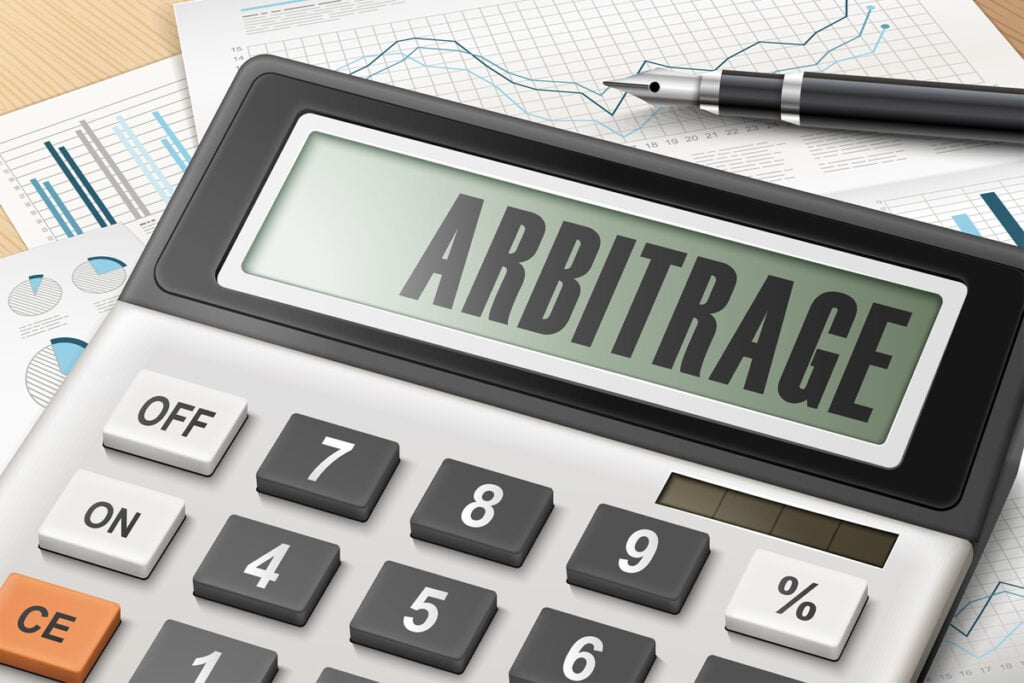Arbitrage is a contentious practise as any issues with the transaction can often come back to haunt the supplier, often another marketplace seller, rather than the Arbitrager themselves. You would think that Arbitragers would end up with a ton of negative feedback but they don’t appear to, so how do they cancel arbitrage sales on eBay when they discover they can’t fulfil them and avoid negative feedback and Item Not Received claims?
What is arbitrage?
Arbitrage is the process of finding an item for sale on a website or often a marketplace and listing it on another marketplace at a higher price to make a margin.
Arbitrage is distinctly different to dropshipping – with dropshipping you have an agreement in place that the dropshipper will fulfil orders for you and often they will enclose your invoices or even use your brand packaging when fulfilling orders. With arbitrage, there is no agreement to fulfil orders and the arbitrager places orders as is they were a consumer and supply a ‘gift’ shipping address. Often they will specify the item is a gift hoping that you won’t include an invoice.
Arbitrage margins are traditionally tight, often as low as £1 or £2 per order. However they have no real cost base as they don’t hold stock so it’s just a numbers game. That’s why you’ll see arbitragers scrape entire websites or an online merchants’ entire set of listings and offer them for sale on another site. When you have 10s of 1000s of listings you only need a relatively small percentage to attract sales for the profits to start rolling in. Arbitragers will typically cancel perhaps 10% of their listings that haven’t attracted sales on a regular basis and replace them with new listings in an attempt to maximise sales without exceeding listing limits on marketplaces.
What’s the impact on the consumer
When arbitrage goes well, there’s little impact on the consumer other than the fact they could have purchased the product direct at a better price if they’d shopped around. However, when things go wrong the consumer ends up with a retailer they’ve never purchased from and possibly an invalidated warranty if they are unable to produce a valid receipt and have no returns rights.
Arbitrage can also cause confusion for consumers as they think they’re buying from one online seller and the parcel arrives direct from a different retailer or is shipped from a different marketplace.
Arbitrage always carries the risk that when an item is sold it is no longer available or that the retailer is now offering the item at a higher price. In these circumstances, arbitragers simply cancel the transaction leaving a frustrated consumer behind.
How can you cancel arbitrage sales on eBay without being penalised?
Arbitragers know only too well that if they fail to fulfil orders on a marketplace that they will be banned. To get around this they have developed a method to avoid their metrics being impacted and which also significantly lowers the risk of negative feedback when they need to cancel arbitrage sales on eBay.
For example, an arbitrager selling on eBay will give superb customer service if they’re unable to fulfil an order. The consumer will get a very apologetic email explaining that the goods are temporarily out of stock and asking if they would like a refund rather than wait a long time for the order to be fulfilled. 99% of the time the consumer will be frustrated and reply demanding their money back which the arbitrager will be only too delighted to do.
What the arbitrager is then able to do is cancel arbitrage sales on eBay using the “cancellation at the buyer’s request” option. This is distinctly different from the eBay seller cancelling the order – the “cancellation at the buyer’s request” option doesn’t impact your seller metrics and if there is ever a query then the seller has the buyers email asking for the transaction to be cancelled in their eBay messages.
For buyers, the alternative is waiting until the expected delivery date is passed and then opening an Item Not Received case on eBay, which will impact the arbitrager’s eBay seller metrics, but how many buyers know this and will be willing to wait a week (or possibly longer) to receive a refund for a product that they know they will never receive?
How come Arbitragers don’t get negative feedback for cancelled orders?
You might expect frustrated buyers to immediately leave negative feedback for the arbitrage eBay seller. Leaving negative feedback is much rarer than you might expect and this is to do with how the transaction was cancelled.
When an eBay seller cancels a transaction at the buyer’s request it is removed from the buyer’s eBay Purchase History. This means that there’s no reminder for the buyer to leave feedback and even if they go looking they’ll be unable to find the transaction.
On the eBay mobile app it’s impossible to leave feedback for a transaction cancelled in this manner and as is well known a huge proportion of eBay sales take place on mobile. That accounts for well over half of cancelled arbitrage eBay transactions avoiding negative feedback.
On a desktop, the average eBay buyer also won’t be aware that they can still leave feedback as the transaction disappears from their purchase history, but buyers can still leave feedback if they use eBay’s Feedback Forum. To find this however, you have to be a pretty knowledgeable eBay buyer.
Arbitragers have figured out this entire process and know that they can avoid impact to their seller status by being proactive with customer support, manoeuvring buyers into requesting a order cancellations and are safe in the knowledge that most of the time the buyer will then be unable to leave negative (or indeed any) feedback.










7 Responses
Arbitrage is a way of fixing the search problem. Banning it does not solve the problem it addressess. The marketplace needs to make arbitage commercially unviable by solving search rather than penalising those caught doing it.
Alan – the search problem is perhaps most succinctly expressed as how do you present the best (one the buyer wants to buy the most) proposition to the buyer consistently across all buyers and shopping experiences.
Arbitrage exploits a failure to do that by allowing a second-best (or worse) offering to be presented which the buyer then purchases. If he saw the better offering from the original vendor, he wouldn’t buy from the arbitrageur.
Hence it’s a failure in search. Hth.
Most of the arbitrage sellers I’ve seen get around search by paying for Sponsored Listings – then, once they’ve sold a couple of an item, they can turn the advertising off and search will generally place their (expensive) one above the competition because eBay sees it as getting sales.
The issue is that sellers holding stock have to get sales on a good percentage of listings, meaning they tend to offer realistic prices but can end up with very tight margins (the kind of item we sell, the margins are around 5%). That means real sellers don’t always have the funds to pay for Sponsored Listings on top of all the other fees.
Arbitrage sellers, on the other hand, don’t have to pay for stock, warehousing, staff to pack the orders etc. Their cost base is limited to listing and final value fees, and the cost of the software they use. They can afford for a much smaller percentage of listings to gain sales and still have funds over to pay for advertising.
Once you add in their savings from orders placed with Amazon sellers where they do’t have to pay for the stock (claiming non-delivery via automated A-Z claim, etc), it all ends up being a business model which is clever but abusive of both buyers and sellers.
A business model that is “abusive of both buyers and sellers” — nicely put! It is also lazy, unethical, and an outright violation of some marketplaces’ TOS; for example, Amazon Prime ‘s TOS expressly forbids buying for resale.
As a buyer, I try to avoid buying from this ilk of seller. If I wanted to receive an item from Amazon, I would shop there. I don’t like to be suckered into supporting and rewarding such a shady business, and I leave neutral feedback that says so.
If you’re not sure whether you’re shopping with an arbitrage seller or not, ask a question about the product. Arbitrage sellers usually know absolutely nothing about the products they list other than for how much the item retails elsewhere and what the stock photo shows.